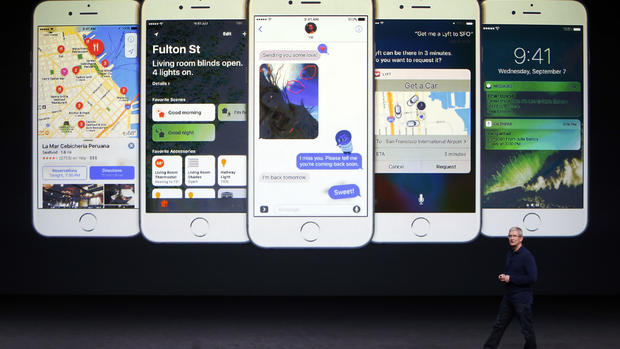Apple gives tiniest nod to privacy while announcing iPhone 7
What more can Apple say to convince customers it’s protecting their personal information? As of Wednesday, it seems the company ran short of new ways to reassure us.
Apple CEO Tim Cook announced the iPhone 7 Wednesday, but never listed its privacy features.
In a video before the main presentation, late-night host James Corden asked Cook if this was the most secure iPhone yet. Cook told Corden it was. (Corden hosts “The Late Late Show” on CBS.)
In the two-hour event that followed, however, Cook and other Apple representatives on stage provided no details on how the latest iPhones are more secure.
We know what Apple has done in previous iPhones to protect our information. The current iPhone model, the 6S, keeps your personal information locked away with encryption, and the company says it takes pains not to collect vast amounts of data on customers like its peers Google and Facebook. What’s more, Cook kicked off Apple’s product announcement event in March by vowing to protect user privacy.
“This is an issue that impacts all of us,” Cook said at the time, “and we will not shrink from this responsibility.”
Still, the claim Wednesday -- most secure iPhone yet -- fits in with Apple’s habit of relying on superlatives to describe its products. Of course, it’s also the “best” iPhone yet, Cook and company said repeatedly.
As Apple’s best selling product, the iPhone has been central to the company’s stance on user privacy.
Apple says it makes money from selling hardware like the iPhone 7 and services like iTunes, not from selling access to user data for things like targeted advertising. Cook has also vowed to maintain customer privacy for features such as the company’s mobile payments service, Apple Pay. Neither merchants nor Apple store your credit card number, and Apple doesn’t track what you’ve purchased.
Earlier this year, the company fought the biggest privacy battle of its history over the iPhone, one that could have repercussions for the rest of the technology sector. Apple fought the US Justice Department and resisted a court order to build a custom version of its iOS software that could have helped the FBI unlock an iPhone 5C used by one of the San Bernardino, California, terrorists. While that suit was dropped, the bigger battle likely won’t end anytime soon.
At its developer conference in June, Apple emphasized its end-to-end encryption and discussed its work on differential privacy, which lets the company maintain personal privacy while analyzing and learning from crowdsourced information.
This article originally appeared on CNET.com.
